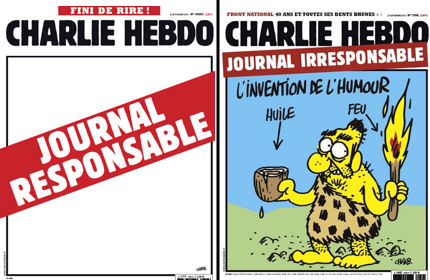Attack on Offices of Satirical Magazine Leaves French Cartoonist Community Bereft

Many folks on this side of the Atlantic woke up this morning to news of a violent attack on Charlie Hebdo, a satirical newspaper with offices in Paris, who made international headlines in the early ’10s for defying public threats, firebombing, and the advice of their own government to publish satirical content and images depicting the prophet Muhammad. In 2012, Charlie Hebdo followed the controversy with the twin issues shown above, in response to politicians and conservative news outlets who called the magazine’s behavior (which is to say, publishing drawings and words that some human beings had said they would use as a convenient excuse to hurt or attempt to hurt other human beings) “irresponsible” and like pouring “oil on a fire.”
While the resolution of the attack this morning is still forthcoming, there are some facts that news outlets are agreeing upon:
- This morning, two gunmen entered the offices of Charlie Hebdo with machine guns and opened fire, escaping in a car driven by a third collaborator. As of the writing of this article they are still at large. Schools in parts of Paris have been evacuated.
- Ten employees of Charlie Hebdo are confirmed to have been slain, as well as two police officers assigned to secure the offices due to the publication’s history with threats, though the editorial staff had received no specific, recent threats. Five others are seriously wounded. This number may represent more than half of the magazine’s editorial staff. Some outlets indicate that the attacks coincided with an all hands editorial meeting.
- So far only five of the slain have been named: Stéphane “Charb” Charbonnier, Cabu, Georges Wolinski, and Bernard “Tignous” Verlhac, all career political cartoonists; and economist and magazine contributor Bernard Maris.
And finally, I’ll quote The Comics Reporter, since I can’t think of a better way to put it:
Unless a counter-narrative develops, the actions and vocalizations of the attackers leads directly to the conclusion that the attack involves the satirical publication’s use of Muhammed-related material, a part of the lengthy cycle of responses to the Danish Cartoons Controversy.
As an American site primarily concerned with “geek entertainment” or what might be more colloquially known as “fandom,” we talk quite a bit about American comics, and to a lesser extent about the broader Asian comics industry, but we don’t talk about much is the thriving, influential Franco-Belgian comics industry. In fact, the last time I remember mentioning it was when a number of conservative American bloggers got their pitchforks out about Batman, Inc.’s introduction of a French-Muslim Batman-helper. So you might wonder why we’re talking about this at all.
Certainly there are probably numerous articles and cartoons featured in Charlie Hebdo that our editors would have taken to task for being racially, religiously, sexually, and any number of other ‘lly’s insensitive. And therein lies the real failure of those who perpetrated this morning’s violence, should their actions, as it truly seems, have been motivated by a desire to silence. If they hadn’t decided to pay the wages of pen and paper with death, there might have been a discussion to be had here about racist or sexist government policies that masquerade as “secularism,” or in the responsibility of Charlie Hebdo‘s (or anyone’s) satire to choose its targets bravely, but also precisely and nobly. But instead, people were killed over art.
And I’m sure you’ll forgive the editors of this site if we say that hits us close to home, as creators and consumers of art both high and low.
Stéphane Charbonnier (47), who went by the pen-name Charb, was the editorial director of the magazine, having held that post since 2012. His career included Maurice et Patapon, the anti-capitalist cat and dog, full of scatological and sexual humor, and his weekly feature in Charlie Hebdo went by the name Charb n’aime pas les gens, or, Charb Does Not Like People.
Jean Cabu (76), more well known by simply his surname, was a famed caricaturist known particularly for his Mon Beuf, a caricature of the average, vulgar, racist, sexist, and ignorant Frenchman. Georges Wolinski (80), co-founded L’Enragé during student riots in 1968, and sparked conservative criticism of sexually explicit comics with his collaboration to create Paulette.
Tignous (57) has penned cartoons against domestic violence, and was an artist of the Cartooning for Peace association. Bernard Maris (68) wrote often under the name “Uncle Bernard,” and has worked with Charlie Hebdo since its refounding in 1992.
(via The New Yorker, The Comics Reporter, Amnesty International, The Guardian, BuzzFeed)
Are you following The Mary Sue on Twitter, Facebook, Tumblr, Pinterest, & Google +?
Have a tip we should know? tips@themarysue.com